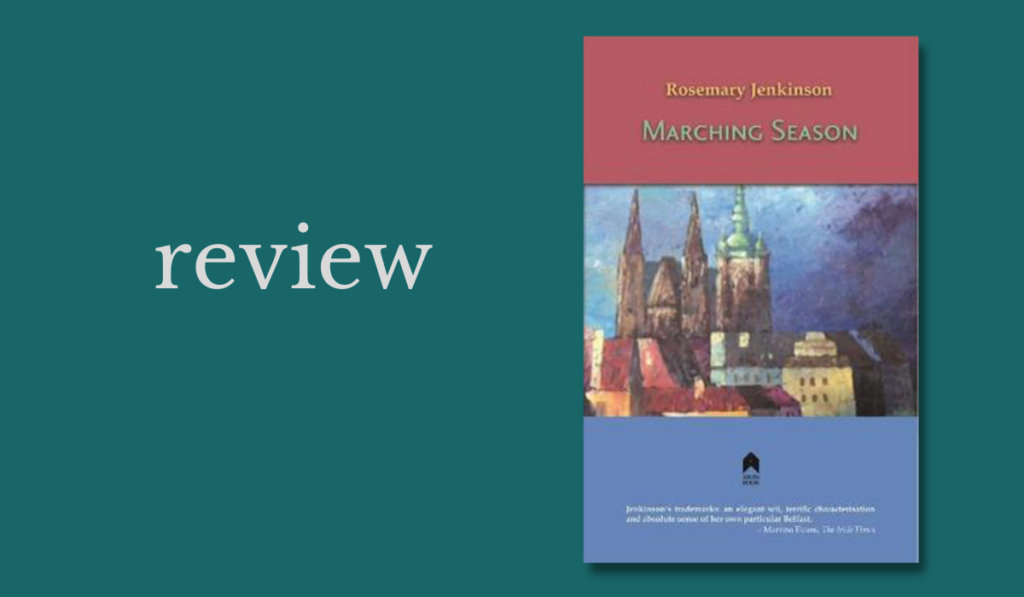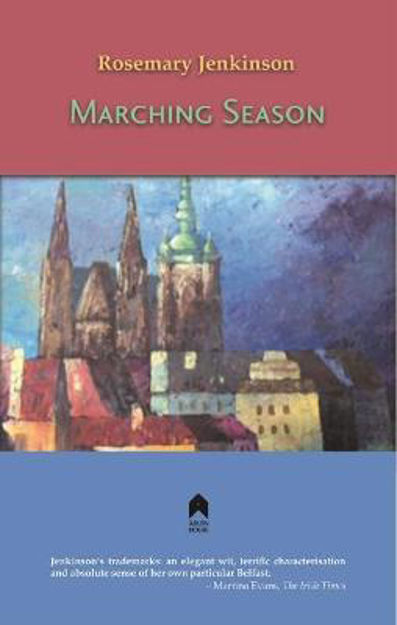
Marching Season|Rosemary Jenkinson|Arlen House|ISBN: 9781851322275|€15
“A keenly-observed, intellectually astute and frequently hilarious exploration of contemporary life in Northern Ireland and abroad.”
—Eoghan Smith on Marching Season, by Rosemary Jenkinson
By Eoghan Smith
Marching Season, published by Arlen House, is a new collection of thirteen stories by Belfast author Rosemary Jenkinson.
Centering on themes of conflicting and interfacing identities, sexual adventurism and exploitation, love, desire, loneliness and authenticity, the book is a keenly-observed, intellectually astute and frequently hilarious exploration of contemporary life in Northern Ireland and abroad.
Fragile tensions
The title of the collection naturally evokes the mid-summer weeks of Orange parades in Northern Ireland, and indeed Belfast is the setting for eight of the stories.
Jenkinson’s Belfast is frequently one where the fragile tensions between communities are just about manageable and occasionally spill over into dangerous riots and terrifying viciousness.
The post-Troubles dispensation, with all its two decade-long-and-counting pressures and fragilities is a constant presence to greater or lesser degrees in the lives and backgrounds of the characters depicted here. It is also a city where progress has doubtlessly been made.
This leads to some wry commentary. In the opening story, ‘The A, B, and C’s of Modern Living’, contemporary Belfast is depicted as a mixture of Troubles-legacy kitsch and post-2008 hipster cool:
The Sunflower was one of the hippest bars in Belfast. It still retained the retro-grit of the security cage on its front door from the Troubles, while being colourful and quirky and covered in trippy street art.
Acid humour
The acidity of the humour is hugely satisfying; Jenkinson’s comedy offers a kind of comfort that lasts only as long as the punchline.
Overall, the collection is a masterclass in narration and tone. One of the most notable aspects of the book is Jenkinson’s judicious register in portraying how people are affected by the ever-present threat of sectarian violence.
The collection’s most harrowing story, ‘The Night They Shot the Journalist’, which recalls the murder of Lyra McKee, is written in clear, spartan, unambiguous language, reminding us – if anyone needed reminding – that there is nothing remotely cool or even distant about The Troubles.
Elsewhere, in the extraordinary title story ‘Marching Season’, Jenkinson deftly avoids the trap of mawkishness in the story of drag queen Marcus from east Belfast, replete with Catholic boyfriend, who defies and succeeds against the bigotry of loyalist rioters (there is a hugely amusing play on the idea of ‘parades’ in this story).
Conflict
These early stories, including two brilliant narratives that feature the same character – an artist named Cora who enters into sexual relationships with hopeless men – conjure up a Belfast where the conflict is not simply between Catholic and Protestant or Republican and Loyalist, or even between the traditional and the modern (though these conflicts are of course present).
Instead, the conflict is often with one’s self. Who someone is, what they make of their lives and how they exercise their autonomy to make their own choices – however confusing or liberating or destructive that ultimately may be – emerge as key issues.
For drag queen Marcus, this means the refusal to conform and to be loyal instead to himself. As he sings his way in full drag through the disbelieving, chaotic rioters, we are told:
Let them beat him to death if they wanted. He was going to be who he was in this community.
Artists
In Belfast, these acts of individual defiance or self-assertion have the potential to produce new meanings and contexts which could begin to dissolve entire traditions.
Ultimately, the story ‘Marching Season’ seems to remind us that all forms of identity are performative; just as Marcus is a drag queen, the loyalists who riot are also acting out their part.
It is no surprise then, that a number of the stories are about artists, because art is at some level always working in the space where reality is being fabricated, performed and captured at the same time.
And although there is sometimes a sardonic treatment of the bourgeois artist-figure as one who is empowered to effect change across class and tribal lines in post-conflict Northern Ireland, Jenkinson’s own artistic eye offers other vantage points from which to view the local.
Beyond Belfast
As the collection develops, the geography of Marching Season expands beyond Belfast to the Republic, to England, to Australia, Prague, Paris, and the Greek islands.
Strikingly, a story about community tensions over an art project that is exploited by politicians in Belfast is titled ‘Portrait of a European City’, liberating the city from a purely local context.
There is also another significant implication in the title: Belfast is not simply an Irish or British city. It is also, and always has been, a European city too.
Another layer of complexity: the identification of Belfast as European also attains a particular meaning in the post-Brexit dispensation, where the argument has been principally between the United Kingdom and the European Union.
Personal drift
As the landscape of Marching Season expands, the later, final stories are about travelling, of leaving and arriving.
If the earlier stories focus on the individuals negotiating their lives amid the stifling intensity of local, tribal identities, later stories such as ‘Pine Needles’, ‘The Airport Game’ and What Happened to You’ explore the sense of personal drift leaving home often brings.
In the lengthy ‘Pine Needles’, a lonely woman in Prague is trapped in an emotionally manipulative relationship with a Japanese artist, while the tender ‘What Happened to You’ centers on the burgeoning but unfulfilled and partially unspoken desire between two young women in Greece.
These love stories – one disturbing, the other tender – echo the Belfast stories in their depiction of the fundamentally complex emotional and sexual relationships between people.

Sex
Marching Season is also a book about varieties of sex. The sex in the stories is sometimes vividly graphic without ever being pornographic.
Occasionally sex is portrayed as mechanistic and visceral, and sometimes it verges on the erotic, even on the sublime.
There is in the stories always a dreadful aching at the heart of sexual desire, particularly in the yearning not for the person but for the touch and feel of another’s body.
The majority of the narrators are female and the male bodies in particular are superbly drawn, they are sinuous and subtle, brutal and overbearing. Stories explore sexual experimentation and freedom: ‘The Cure for Too Much Loving’ depicts a developing consensual female-female-male threesome forged out of loneliness while ‘The Airport Game’ features a spontaneous and damaging competition of sexual attraction between two men (one unsuspecting) and a woman in the bar of Dublin airport.
Searching for self-hood
These cross-cultural and polyamorous sexual encounters, which are by turns hetero-, bi-, and homosexual, speak on one level to a culture of personal freedom, and on another level they are metaphors for the quest for selfhood within the tangled woods of other people’s lives, expectations and communities.
But, no matter where we are or who we are with, or the choices that we make, Jenkinson fundamentally tells stories of heartbreak and heartache, of sexual desire fulfilled and unfulfilled, of people who are in search of something to fill the holes in the middle of their lives, and of people who sometimes find fleeting moments of solidity.
Marginal space
Marching Season can be added to the lengthy list of excellent Irish short story collections published in the last ten years.
In his classic work The Lonely Voice, Frank O’Connor says that ‘always in the short story there is this sense of outlawed figures wandering about the fringes of society’, a definition which could be applied to Marching Season.
Jenkinson’s characters are in this marginal space, for these are stories about loneliness, of being unsure of one’s self, of trying to find an accommodation with personal and political disorder.
Happiness is elusive and occasional; life turns on misunderstandings and miscommunications.
Among the final words of the collection, the female narrator of ‘What Happened to You’ captures the book’s theme perfectly: ‘There’s a strange liquidity in the air that makes everything on the verge of dissolution’.

Eoghan Smith is the author of The Failing Heart (Dedalus 2018). His second novel, A Provincial Death, will be published in February 2022 by Dedalus.












